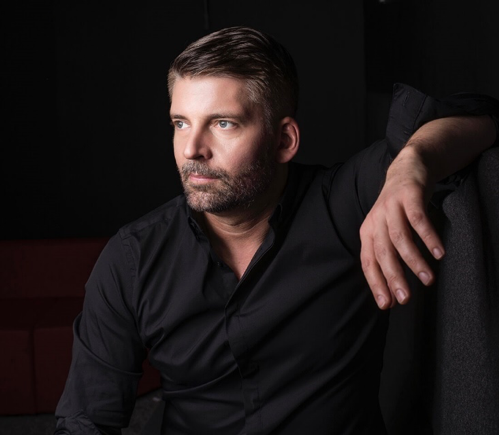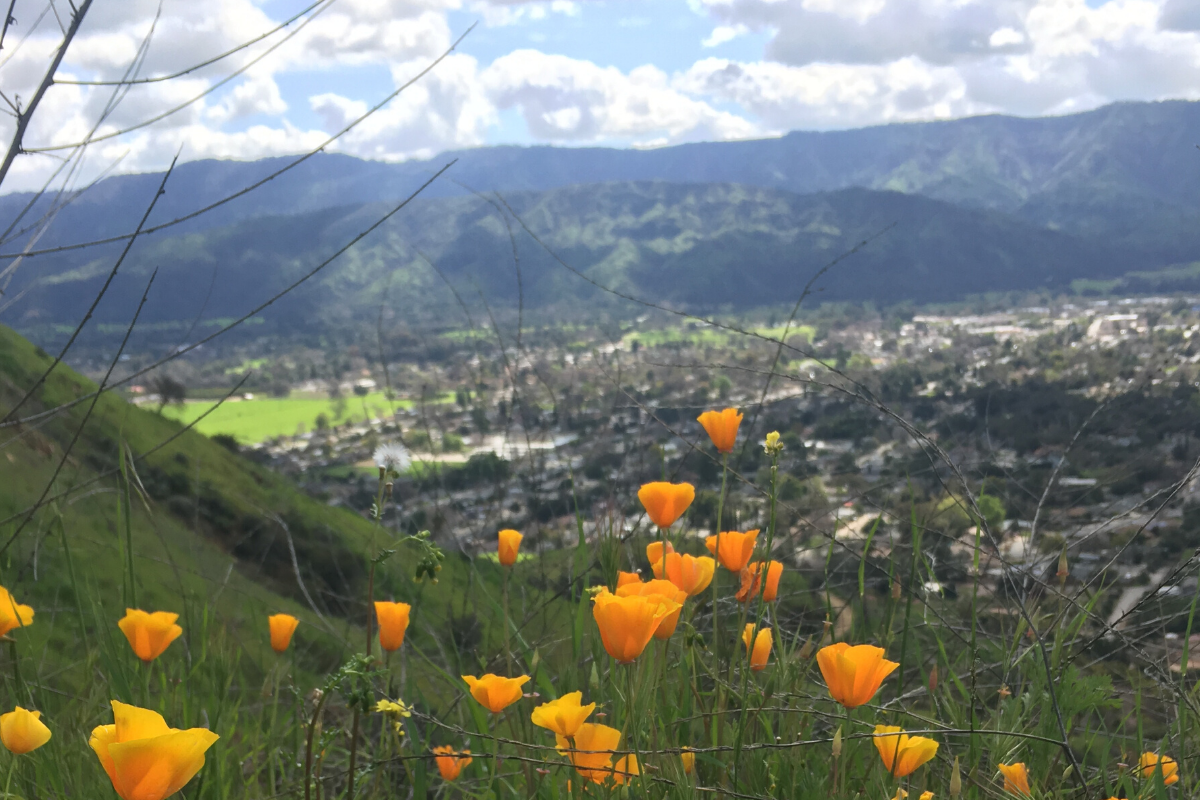Press Play; Click Box Above to Go Full Screen [ ]
Concert Notes
PIERRE BOULEZ (1925-2016)
sur Incises (1995-98)
MATTHIAS PINTSCHER (b. 1971)
bereshit (2012)
In Search of Beginning
sur Incises — written specifically for the musicians of EIC — occupies a lofty position in the Boulez canon. A prime exemplar of the composer’s labyrinthine creativity, it proliferated from a brief, occasional work: Incises for solo piano, which was written for the contestants in the 1994 Umberto Micheli Piano Competition in Milan. Boulez defined “Incise” as “a rhythmic unit of several notes analogous to a motif.” In 1996 he expanded to Incises as a birthday gift for the music patron Paul Sacher’s 90th birthday. The labyrinth is never linear: in fact, Incises itself adapted a musical idea spelling Sacher’s name (as transcribed into the notes E-flat—A—C—B—E—D), which Boulez had introduced in Messagesquisse for his 70th birthday in 1976.
sur Incises went through various expansions and revisions into the vast, scintillating structure we hear for an ensemble of nine musicians. The composer continued to refer to it as a “work-in-progress.”
The number three plays a determinative role, beginning with three groups of three players each: three pianos, three harps, and three percussionists playing tuned instruments. Boulez initially had in mind “a kind of piano concerto” for Maurizio Pollini “although without reference to the traditional form,” he recalled. Stravinsky’s use of four percussive pianos in Les noces was among his sonic models.
A good deal of the work’s fascination lies in Boulez’s endlessly inventive combinations and juxtapositions of texture. The instrumental cast of characters dramatizes a kind of deconstruction of the piano as sound-producing object, which is then “reassembled,” as the musicologist Wolfgang Fink observes: “the harps represent the piano strings, while the resonators of the bells, vibraphone, and marimba represent its soundboard” and the steel drums evoke “a prepared piano.” Boulez also uses strategic spatial positioning of the players to highlight the shifting textures: as the music ricochets between groups, “you see what you hear.”
The percussion instruments and harps, explains the composer, “are at times completely integrated and sometimes play only a minor role.” In one section, “the pianos play an elaborate ostinato passage, thus a very strict compositional structural form while the percussionists simultaneously play very free figures. But you also find moments when this role play is divided up, such that one piano and one percussionist play the free structures while the other pianos and percussionists must follow the strict ostinato movement … Another attractive aspect is that at times you encounter very quick changes followed by sections of continuous instrumental combinations.”
Wanting to do away with “the idea of compartments in a work,” Boulez refers to the example of Proust, “where you find that the narration is continuous.” Even though Proust’s great novel is divided into chapters, “the work has to be read in one go. That is one of my main goals in music (for large works). I don’t want any breaks in the music, but you can introduce new ideas and abandon some other ideas, like the characters in a novel.”
The blank page holds terror — and endless possibility. For there is no single right beginning, but as many beginnings as can be imagined. Matthias Pintscher dramatizes the act of creation by boldly linking it with the myth of cosmogony with which the Bible begins. bereshit, the very first word of the Hebrew Torah (and of what is more widely known as the Book of Genesis), reminds us of how slippery our putatively fixed points of origin actually are.
That the first word of divine revelation should begin not with aleph but with the second letter of the alphabet is a matter of much discussion in Jewish teaching, as is the inaccuracy of the familiar translation “in the beginning” (there is no definite article in the construction bereshit). Properly, the phrase means “in a beginning.” Deeply fascinated by the bridges between spoken and musical language, Pintscher — who learned Hebrew while living in Israel during his 20s — remarks that “words [in Hebrew] are like islands, like energy sources” because so much is derived from “short root words” — such as the root rosh (“head”) in bereshit. Elsewhere, Pintscher likens the piece to “a great river.”
EIC premiered bereshit in Paris early in 2012; later that year, Pintscher introduced his two-part Chute d’Étoiles (“Falling Stars”), which similarly addresses the theme of cosmic beginnings — here, conceptualized as the Big Bang and paying homage to a sculptural installation by Anselm Kiefer.
The musical point of departure in bereshit is also a psychological one: “as if you woke up in a strange room in the pitch darkness of night, realizing your whereabouts only after a few seconds,” according to the composer. “In this state, you attempt to make out the shapes of the space. It is a beginning of a beginning from absolute darkness and shapelessness. Very cautiously and gradually, particles disentangle and then condense, fitting together in shapes.”
The initial sound, emerging from silence, is an incredibly soft, flutelike, sustained F in the highest register of a solo double bass. Pintscher likens the note F to a “horizon” that stretches across the composition. It gives way to percussive sounds “from which elements then detach and condense.” He describes the music as “highly organic,” the material “developing slowly, in quasi-chronological fashion.” Overall, bereshit “arose from the idea of liberating an entire compendium of sounds, gestures, rhythms, and orchestral combinations from a primordial state of sound.” Within Pintscher’s body of work, bereshit‘s concept of sound and space “ventures far beyond the chamber music-like dimension of ensemble forces.”
—Thomas May
Artist Bios
Matthias Pintscher, Music Director
 “It is a tremendous pleasure and incredible honor to be music director for the 2020 Ojai Festival, something I have dreamed about since moving to New York twelve years ago. I feel a combination of joy and responsibility to showcase composers and works that create something like an INVISIBLE BRIDGE between the two continents in which I am living and working: Europe and the USA. I have realized that my role as musical communicator – as composer, conductor, educator, and festival di- rector – is to actively strengthen the interactions and connections between the music of today and its heritage in the US and on the “old continent”. As a European living in New York and Paris, I want to explore this INVISIBLE BRIDGE as one of the key elements for my programming of the 2020 Ojai Festival: thoughtful, innovative, loving, provocative, and poetic. Music speaks most directly from hu- man to human, and Ojai is a perfect place to showcase this. I am excited. See you in 2020.” – Matthias Pintscher, 2020 Music Director
“It is a tremendous pleasure and incredible honor to be music director for the 2020 Ojai Festival, something I have dreamed about since moving to New York twelve years ago. I feel a combination of joy and responsibility to showcase composers and works that create something like an INVISIBLE BRIDGE between the two continents in which I am living and working: Europe and the USA. I have realized that my role as musical communicator – as composer, conductor, educator, and festival di- rector – is to actively strengthen the interactions and connections between the music of today and its heritage in the US and on the “old continent”. As a European living in New York and Paris, I want to explore this INVISIBLE BRIDGE as one of the key elements for my programming of the 2020 Ojai Festival: thoughtful, innovative, loving, provocative, and poetic. Music speaks most directly from hu- man to human, and Ojai is a perfect place to showcase this. I am excited. See you in 2020.” – Matthias Pintscher, 2020 Music Director
Matthias Pintscher is the Music Director of the Ensemble Intercontemporain, the world’s leading contemporary music ensemble founded by Pierre Boulez. In addition to a robust concert season in Paris, he toured extensively with them throughout Europe, Asia, and the United States this season including concerts in Berlin, Brussels, Russia, and the United States. Known equally as one of to-day’s foremost composers, Mr. Pintscher will conduct the premiere of his new work for baritone, chorus, and orchestra, performed by Georg Nigl and the Chorus and Symphonieorchester des Bayer- ischen Rundfunks at their Musica Viva festival in February 2020.
In the 2019/20 season, Mr. Pintscher makes debuts with the symphony orchestras of Montreal, Baltimore, Houston, Pittsburgh, and with the Detroit Symphony Orchestra at Interlochen. He also makes his debut at the Vienna State Opera conducting the premiere of Olga Neuwirth’s new opera Orlando, and returns to the Staatsoper Unter den Linden in Berlin to conduct performances of Beat Furrer’s Violetter Schnee, which he premiered in January 2019. Re-invitations this season include the Cleveland Orchestra, Orchestre de la Suisse Romande, and Chamber Orchestra of Europe. In summer 2020, Mr. Pintscher will serve as Music Director of the 74th Ojai Music Festival.
Highlights of Mr. Pintscher’s 2018/19 season included serving as the Season Creative Chair for the Tonhalle-Orchester Zürich, as Artist-in-Residence at the Los Angeles Chamber Orchestra, and con- cluding a nine-year term as the BBC Scottish Symphony Orchestra’s Artist-in-Association. Last season, Mr. Pintscher made his debuts with the Saint Louis Symphony Orchestra, Rotterdam Philharmonic, and the Staatsoper Berlin, and returned to the symphony orchestras of Chicago, Cincinnati, Cleveland, Indianapolis, Milwaukee, the New York Philharmonic, the New World Symphony in Miami, and the Music Academy of the West. In Europe, he conducted the Scottish Chamber Orchestra at the Edinburgh International Festival and returned to the Orchestre de Paris, Danish National Symphony Orchestra, and Helsinki Philharmonic. Mr. Pintscher also conducted the premiere of his work Nur, a new concerto for piano and ensemble, performed by Daniel Barenboim and the Boulez Ensemble in January 2018. An enthusiastic supporter of and mentor to students and young musicians, Mr. Pintscher served as Principal Conductor of the Lucerne Festival Academy Orchestra from 2016- 2018 and worked with the Karajan Academy of the Berlin Philharmonic in their 2017/18 season, culminating in a concert at the Philharmonie.
Matthias Pintscher began his musical training in conducting, studying with Pierre Boulez and Peter Eötvös in his early twenties, during which time composing took a more prominent role in his life. He rapidly gained critical acclaim in both areas of activity, and continues to compose in addition to his conducting career. As a composer, Mr. Pintscher’s music is championed by some of today’s finest performing artists, orchestras, and conductors. His works have been performed by the Boston Symphony Orchestra, Chicago Symphony, Cleveland Orchestra, New York Philharmonic, Philadelphia Orchestra, Berlin Philharmonic, London Symphony Orchestra, Royal Concertgebouw Orchestra, and the Orchestre de Paris, among many others. Bärenreiter is his exclusive publisher, and recordings of his compositions can be found on Kairos, EMI, Teldec, Wergo, and Winter & Winter. Mr. Pintscher has been on the composition faculty of The Juilliard School since 2014.
Thursday Playlist
UNSUK CHIN Gougalōn
Ensemble intercontemporain (EIC)
Matthias Pintscher conductor
MATTHIAS PINTSCHER bereshit
EIC
Matthias Pintscher conductor
PIERRE BOULEZ sur Incises
Ensemble intercontemporain (EIC)

